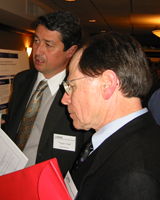 |
Dr. Vlad and Dr. David H. Weaver discuss the poster presentation at the conference. |
Research Conclude Media Only Partly to Blame For Misunderstanding of Facts about Iraqi War
While the media are likely to have contributed to public mistaken beliefs about the case for the U.S. invasion of Iraq, evidence that the media played a major role in creating the misunderstanding is lacking, researchers at the University of Georgia and the University of Nebraska reported at a scientific conference in Chicago.
In addition, declining support for the war in Iraq may explain why people have changed their views about the case for the war, rather than the other way around, the researchers suggested.
Lee B. Becker, Allan L. McCutcheon and Tudor Vlad presented their perspective on the role of the media in creating support for the Iraqi war at the Midwest Association for Public Opinion Research conference in Chicago. About 180 researchers attended the conference on November 17 and 18.
Drs. Becker and Vlad are director and assistant director, respectively, of the James M. Cox Jr. Center for International Mass Communication Training and Research, a unit of the Grady College of Journalism and Mass Communication at the University of Georgia. Dr. McCutcheon is Director of the Gallup Research Center at the University of Nebraska.
Dr. Vlad and Dr. Becker also presented a second paper at the conference based on research they have conducted in the Cox Center on the training of journalists. That study showed that short workshops on topical issues help journalists develop new ideas for stories and can link them to new sources that help them better cover their stories.
The paper on the knowledge base for the war in Iraq focused on earlier research showing that the news media, and particularly Fox News, were responsible for what were termed “misperceptions” about the war. Included were the false view that former Iraqi President Saddam Hussein was linked to the September 11, 2001, attack on the United States, the view that Iraq had weapons of mass destruction before the war and the view that world public opinion supported the U.S. invasion.
The three public opinion researchers showed that the evidence in support of the attribution of the false beliefs about the war is quite limited. They focused their analyses on the mistaken belief that Saddam is linked to the terrorist attacks, noting that the view has declined over time, though as of early 2006 nearly four in 10 U.S. adults continued to believe such a link existed.
The researchers argued, however, that the changes in the percentage of the population holding this view are not easily attributed to the media. Though the view that Saddam was linked to the attacks on the U.S. is associated with attitudes about the war, they also noted, it is at least as possible that the attitudes toward the war changed first and then citizens changed their view of the “facts” about the war in response.
The paper presented by the trio, titled “Who Really Thinks Saddam Was Personally Involved?
Examining Changes in Misperceptions about the Iraq War,” was part of a session at the conference on attitudes toward the war in Iraq.
The paper written by Drs. Vlad and Becker was presented in a poster-session with 12 other papers. Drs. Becker and Vlad concluded that among the effects of training programs for journalists is an increase in enthusiasm for reporting on the topics covered by the training workshops and increased confidence in the ability to handle the story.
The paper, based on an evaluation conducted by the Cox Center of journalism training programs operated by the University of Maryland and supported by the John S. and James L. Knight Foundation in Miami, also showed that journalists share their experiences in the training workshops with their colleagues once they return to their newsrooms.
The paper was titled: “The Duration of Impact of Midcareer Training Programs for Journalists.”
Dr. Vlad served as a discussant in a third session at the conference, titled International Opinion. Dr. Vlad critiqued the four papers in the session and offered suggestions for future work on the topics.
Dr. Becker also offered comments in a session called Looking Back at 30 Years of MAPOR. Dr. Becker said one of the special aspects of MAPOR is its receptivity to and support for student contributions to the conference.
- “Who Really Thinks Saddam Was Personally Involved? Examining Changes in Misperceptions about the Iraq War” by Lee B. Becker, Allan McCutcheon and Tudor Vlad.
- “The Duration of Impact of Midcareer Training Programs for Journalists,” by Tudor Vlad and Lee B. Becker.

